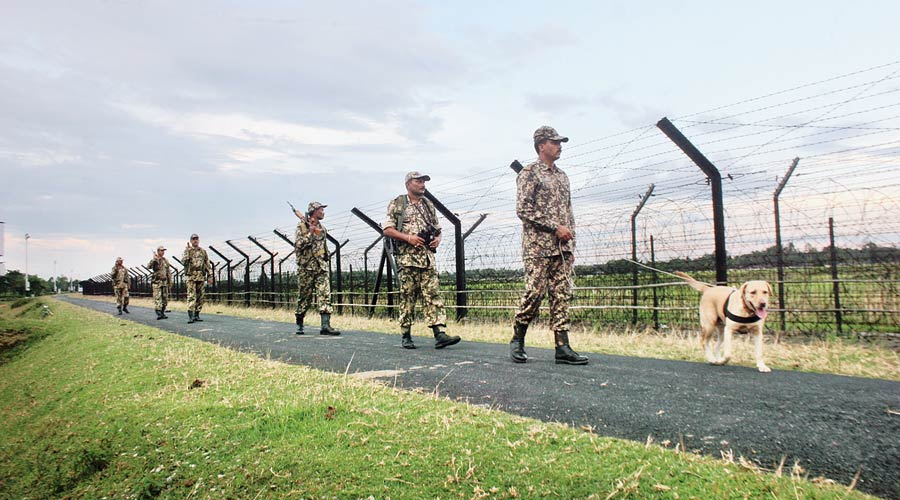There are rumblings in West Bengal and Punjab over the jurisdiction of the world’s largest border guarding force, the BSF, raised in 1965 to protect the Indo-Pakistan and Indo-Bangladesh frontiers. The Union home ministry has just extended the area of operation of the Border Security Force (its powers include arrest, search and seizure) up to 50 kilometre in these two states and Assam. Earlier, its jurisdiction was limited to up to 15 km in these states. To ensure uniformity, it has curtailed the area in Gujarat from 80 km to 50 km.
The move, announced in a gazette notification, has been criticized by the Bengal and Punjab governments as an attack on the federal structure of the country and an attempt to clip the rights of the state police. Does their grouse ring a bell? In 2012, Narendra Modi, as the Gujarat chief minister, had opposed a Central government move to expand the BSF’s jurisdiction. He had written to the then prime minister, Manmohan Singh, accusing the Centre of weakening the country’s federal structure. The move, he alleged, was an attempt to “create a state within a state”.
In 2014, the home ministry’s notification said the BSF’s jurisdiction covered “the states of Manipur, Mizoram, Tripura, Nagaland and Meghalaya and so much of the area comprised within a belt” of 80 km in Gujarat, 50 km in Rajasthan and 15 km in the states of Punjab, West Bengal and Assam. The new notification amends the earlier one with: “Manipur, Mizoram, Tripura, Nagaland and Meghalaya and Union Territories of Jammu and Kashmir and Ladakh and... a belt of 50 km in the states of Gujarat, Rajasthan, Punjab, West Bengal and Assam”.
Taking a cue from Modi, the states can argue that law and order is a state subject and the move will infringe on their powers. Exercising powers under the BSF Act of 1968, the home ministry has extended the BSF’s powers under the Criminal Procedure Code, the Passport (Entry into India) Act, 1920 and Passport Act, 1967.
While the parliamentary standing committee for home has decided to scrutinize border management, the need of the hour is to boost the morale of the force, not add to its area of operation. A visit along the border reveals how isolated and at the mercy of adversaries these personnel can be; many of them have committed or contemplated suicide and fragging is no longer rare.
On a BSF border track along Bangladesh for nearly 30 km from Agartala to Kamalasagar (primarily fortified, since 833 km of Tripura’s 856 km international border has been fenced with barbed wire), there is a single sentry at each post, armed with a rifle and walkie-talkie, certainly no match for a gang of desperate smugglers.
Add to that the prospect of staring for hours at miles of fields trying to decipher cows or drug smugglers and battling the vagaries of nature (the shelter is no protection against squalls, or swarms of insects and reptiles in pitch darkness). Combating trans-border crimes can be a superhuman task in these circumstances.
A former inspector-general of the BSF, who was director of the BSF Academy, told me the “force must be utilized for the purpose it was raised, not for election duty, fighting Naxalites or helping the police during communal riots. Unless the BSF companies are rotated to the battalion headquarters, the men will continue to face the brunt. We must ensure their welfare.”
Why were the BSF’s powers not enhanced with regard to the Arms Act, Customs Act and Narcotic Drugs and Psychotropic Substances Act, since these cover most of the smuggling offences along the border? Unlike in China, India’s efforts to fortify border infrastructure are minimal. Just increasing area jurisdiction defeats the very purpose of enhanced vigilance. It makes the ill-equipped posts soft targets and our solo-act jawans sitting ducks!










